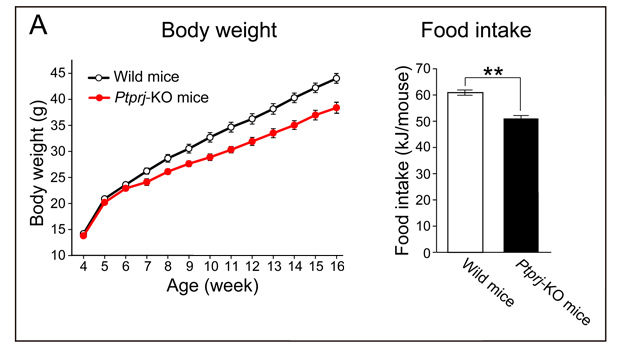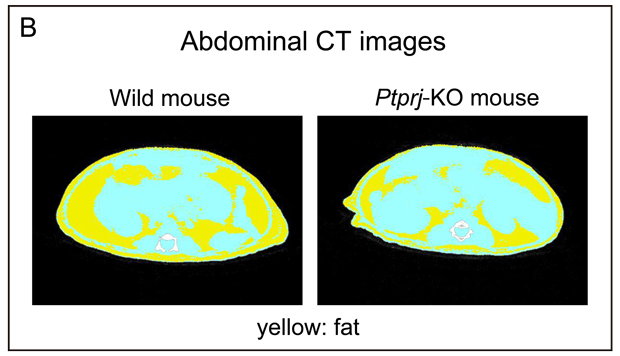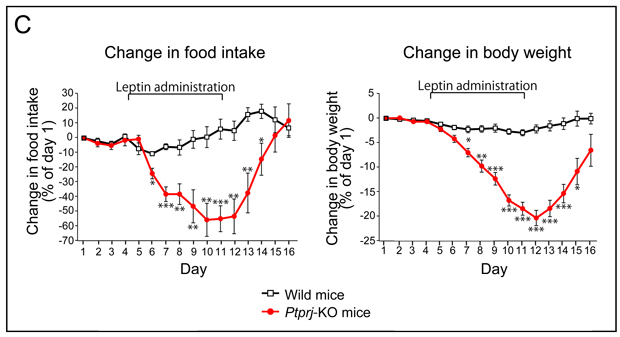
National Institute for Basic Biology




2017.09.14
Leptin is an adipocyte-derived hormone that stimulates hypothalamic neurons to strongly inhibit food intake. Leptin signaling in the hypothalamus, a part of the mid-brain, thus plays a crucial role in the regulation of body weight: Leptin resistance, in which leptin signaling is disrupted, is a major obstacle to the improvement of obesity. However, the exact mechanisms underlying leptin resistance in obese patients have yet to be elucidated.
The research group of Professor Masaharu Noda, Associate Professor Takafumi Shintani, and a graduate student Satoru Higashi of the National Institute for Basic Biology (NIBB) demonstrated that protein tyrosine phosphatase receptor type J (PTPRJ) inhibits leptin signaling and that induction of PTPRJ in the hypothalamus is a cause of leptin resistance.
They showed that Ptprj is expressed in hypothalamic neurons together with leptin receptors, and that PTPRJ inhibits activation of the leptin receptor through dephosphorylation of JAK2, a protein tyrosine kinase associated with the leptin receptor. Ptprj-deficient (Ptprj-KO) mice showed no growth retardation, but exhibited lower weight gain, because of a lower food intake and a lower adiposity, than wild-type (WT) mice (Figure A and B). Importantly, PTPRJ expression in the hypothalamus was up-regulated by diet-induced obesity, and, thus, diet-induced leptin resistance did not occur in Ptprj-KO mice (Figure C). Furthermore, the overexpression of PTPRJ in the hypothalamus induced leptin resistance in lean mice. These results strongly indicate that PTPRJ plays critical roles in the development of leptin resistance. The inhibition of PTPRJ may be a potential strategy for improving obesity.
The results of this research were published in ‘Scientific Reports’ on September 14, 2017.

Figure A. Ptprj-KO mice exhibit a lean phenotype and show resistance to diet-induced obesity. Weekly body weights by wild-type (WT) and Ptprj-KO (KO) male mice fed a high fat/high sucrose diet (HF/HSD) from 4 of age (left). Daily ND intake by WT and KO mice during 12 weeks of age on HF/HSD (right).

Figure B. Representative CT images of WT and KO mice fed HF/HSD at 16 weeks of age. Yellow and blue regions indicate fat and lean tissue, respectively.

Figure C. Daily change in food intake by (left) and daily change in body weights of (right) WT and KO mice fed HF/HSD for 14 weeks upon daily administration of leptin. Leptin (500 ng) or vehicle was i.c.v. injected as indicated 1 h before the onset of the dark phase in WT and KO mice.
Scientific Reports
"PTPRJ Inhibits Leptin Signaling, and Induction of PTPRJ in the Hypothalamus Is a Cause of the Development of Leptin Resistance"
Takafumi Shintani, Satoru Higashi, Ryoko Suzuki, Yasushi Takeuchi, Reina Ikaga, Tomomi Yamazaki, Kenta Kobayashi, and Masaharu Noda